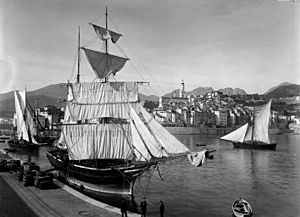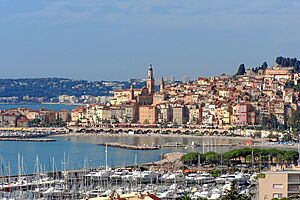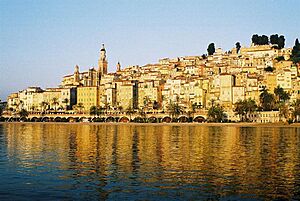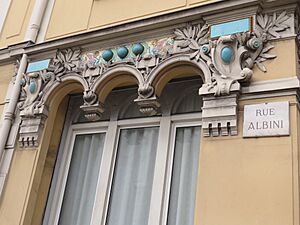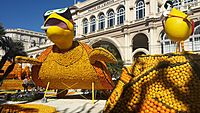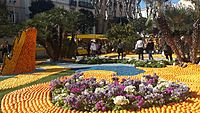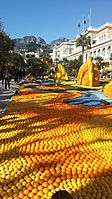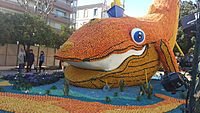Menton facts for kids
Quick facts for kids
Menton
|
||
|---|---|---|
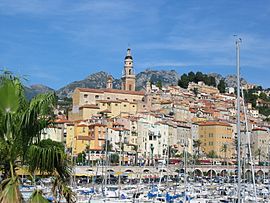
Part of the old town from le vieux port.
|
||
|
||
| Country | France | |
| Region | Provence-Alpes-Côte d'Azur | |
| Department | Alpes-Maritimes | |
| Arrondissement | Nice | |
| Canton | Menton | |
| Area
1
|
17 km2 (7 sq mi) | |
| Population
(2012)
|
29,073 | |
| • Density | 1,710/km2 (4,430/sq mi) | |
| Time zone | UTC+01:00 (CET) | |
| • Summer (DST) | UTC+02:00 (CEST) | |
| INSEE/Postal code |
06083 /06500
|
|
| Elevation | 0–774 m (0–2,539 ft) (avg. 16 m or 52 ft) |
|
| 1 French Land Register data, which excludes lakes, ponds, glaciers > 1 km2 (0.386 sq mi or 247 acres) and river estuaries. | ||
Menton is a lovely town, also called a commune, located in the Alpes-Maritimes area of France. It sits right on the beautiful Mediterranean Sea, very close to the border with Italy. Menton is famous for its mild weather and its many lemon trees.
Contents
History of Menton
Ancient Times and Early Settlements
People have lived in the Menton area for a very long time. Scientists have found signs of humans from the paleolithic era, which was the Stone Age. They even found remains of early modern humans, called "Grimaldi Man", as well as Neanderthals.
Later, during the time of Ancient Rome, an important road called the Via Julia Augusta passed through Menton. This road connected different Roman cities.
Becoming Part of Genoa
The first big town in Menton started around the 11th century. A powerful count from Ventimiglia built a castle on a nearby hill. Later, in the 13th century, a family from Genoa built a new castle closer to the sea. This new castle became the center of the town we see today.
Because of this, Menton became part of the Republic of Genoa, which was a strong city-state in Italy. The first time Menton was officially mentioned was in a peace treaty in 1262. Menton was important because it was right on the border between two powerful areas: Provence (ruled by France) and Genoa.
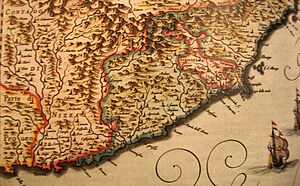
Under the Princes of Monaco
In 1346, Charles Grimaldi, the Lord of Monaco, took control of Menton. The town was then ruled by the Princes of Monaco for many centuries. This lasted until the French Revolution in the late 1700s.
During the French Revolution, Menton became part of France. It stayed French even during the time of Napoleon Bonaparte.
Changes After Napoleon
After Napoleon's rule ended in 1814, Menton became part of a newly formed Monaco. However, Monaco was under the protection of the King of Sardinia. The Princes of Monaco had to show respect to the King of Sardinia for Menton.
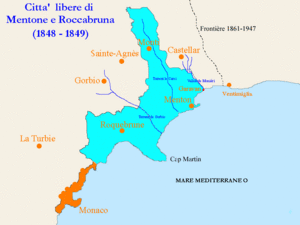
Becoming a "Free City"
In 1848, Menton and its nearby town, Roquebrune, decided to leave Monaco. One big reason was a tax on lemons, which was very important for Menton's economy. They declared themselves "free cities."
Two years later, they asked the Kingdom of Sardinia for protection. They were managed by the House of Savoy for ten years.
Joining France Permanently
In 1860, a special agreement called the Treaty of Turin was made. It said that the area around Nice, including Menton, would become part of France. This was a reward for France helping Italy in a war.
People in Menton and Roquebrune voted on this change. Most people voted to join France. So, in June 1860, Menton officially became part of France. The French emperor, Napoleon III, paid the Prince of Monaco a large sum of money for giving up his rights to Menton.
Menton as a Tourist Spot
In 1861, an English doctor named James Henry Bennett wrote a book about Menton's climate. He said it was a great place for people with lung problems, like tuberculosis. This made Menton very popular.
By the end of the 1800s, many rich English and Russian people came to Menton. They built beautiful hotels and villas. During World War I, some of these grand buildings were used as hospitals for injured soldiers.
World War II and Liberation
During World War II, in June 1940, Italy invaded France and captured Menton. A large part of the town was taken over by Italy. This lasted until September 1943.
After that, Menton was occupied by Nazi Germany. Finally, American and Canadian soldiers helped free Menton on September 8, 1944.
Geography of Menton
Menton is often called the Pearl of France. It is located right on the Mediterranean Sea, very close to the border with Italy. The Italian town of Ventimiglia is just across the border.
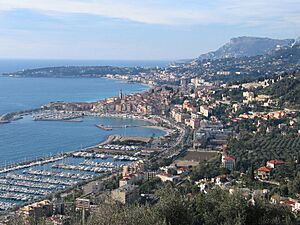
The fishing industry in Menton faced problems in the 1980s and 1990s. This was due to too much fishing and low oxygen levels in the bay. Some people thought it was caused by a type of seaweed called Caulerpa taxifolia, sometimes called "killer algae." However, later studies showed that this seaweed actually helped clean the water and was good for local fish and other sea life.
Climate in Menton
Menton has a special kind of Mediterranean climate. This means it has hot summers and mild winters. The winters are milder and the summer nights are warmer than in many other parts of the French Mediterranean coast.
This unique weather is perfect for growing tangerine, orange, and especially lemon trees. That's why the lemon is one of Menton's symbols! It rarely freezes in winter, and summer temperatures usually stay below 30°C (86°F).
Townscape: What to See in Menton
Menton is famous for its beautiful gardens. Some of the most well-known gardens include the Jardin Serre de la Madone, the Jardin botanique exotique de Menton (also called 'Le Val Rahmeh'), and the Fontana Rosa.
- Le Val Rahmeh was started in 1905 by an Englishman named Sir Percy Radcliffe. He named it after his wife.
- Villa Fontana Rosa was built in 1922 by Vicente Blasco Ibáñez, a Spanish writer. You can visit these gardens today.
Menton also has many interesting buildings and places:
- Saint-Michel-Archange Basilica: This beautiful church was built in 1619. It has a tall bell tower and is designed in the baroque style.
- Bastion Museum: This museum is located in an old fort by the port. It was decorated by a famous artist named Jean Cocteau. The fort was built in 1636 to protect the port.
- Town Hall Wedding Room: The wedding room in Menton's town hall was painted by Jean Cocteau in the 1950s. He turned it into a giant artwork.
- Beaches: Menton has several lovely beaches where you can relax and swim.
- Historic Covered Market: This market was built in 1898 by a local architect. It's a beautiful old building where you can buy fresh vegetables and other local products. It's open almost every day.
- Jean Cocteau Museum: This modern museum opened in 2011 and is also dedicated to the artist Jean Cocteau. It's located near the Bastion Museum.
Mentonasc Language
In Menton and nearby villages like Roquebrune, some people speak a special local language called Mentonasc. About 10% of the people still speak it. It is taught in French schools as a type of Occitan.
However, some language experts believe Mentonasc is actually more like a mix between the Niçard dialect and the Ligurian language from Italy. They think it has a lot of Italian roots, with French influences added later.
Origin of the Name Menton
The name Menton sounds like the French word for "chin," but there doesn't seem to be a connection. Some experts believe the name comes from the old Roman name Mento.
Another idea is that it comes from Mons Ottonis, which means "Otto's Mountain." This could be named after Otto II, a count from Ventimiglia who lived a long time ago. In the local Mentonasc language, the city's name is Mentan. In Italian, it is Mentone.
Someone from Menton is called un mentonnais or un mentonasque in French. In the local dialect, they are called O mentonasc.
Annual Town Events
Lemon Festival
Menton is famous for its amazing Lemon Festival, which happens every February. Each year, the festival has a different theme, like "Viva España" or "Disney."
The festival lasts for several days. There are parades with bands and decorated floats. The Casino Gardens in the center of town are decorated with thousands of lemons and oranges. Huge temporary statues are built and covered entirely with citrus fruits!
Other Festivals
The Casino Gardens also host Menton's Christmas Festival.
Menton also has a Classical Music Festival every year. It takes place in the heart of the old town.
- Menton Lemon Festival
Images for kids
See also
 In Spanish: Menton para niños
In Spanish: Menton para niños
 | George Robert Carruthers |
 | Patricia Bath |
 | Jan Ernst Matzeliger |
 | Alexander Miles |



